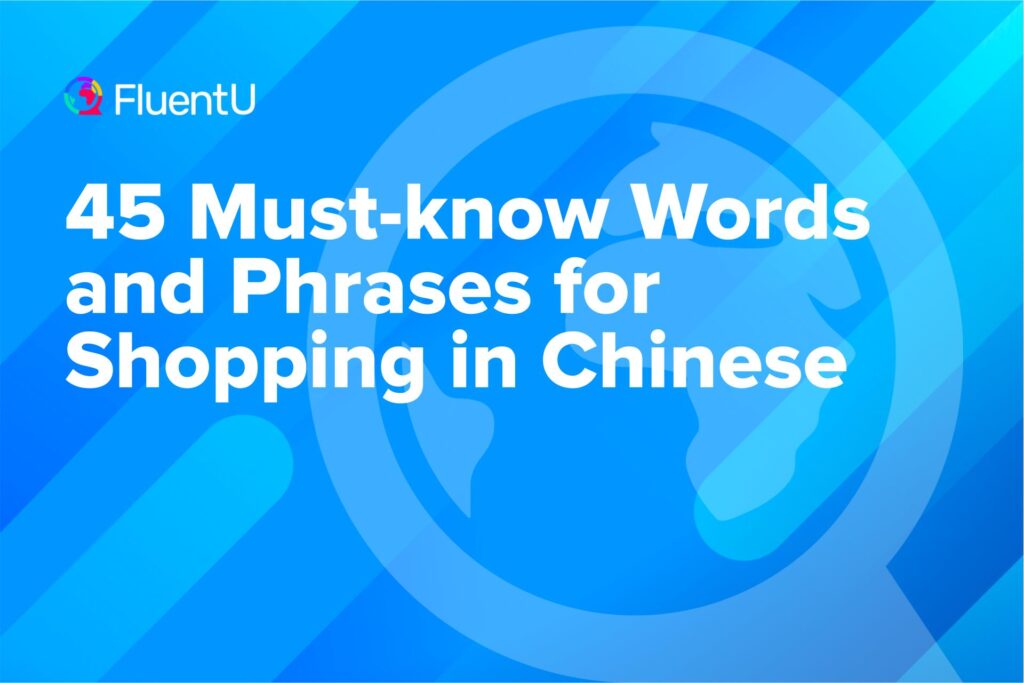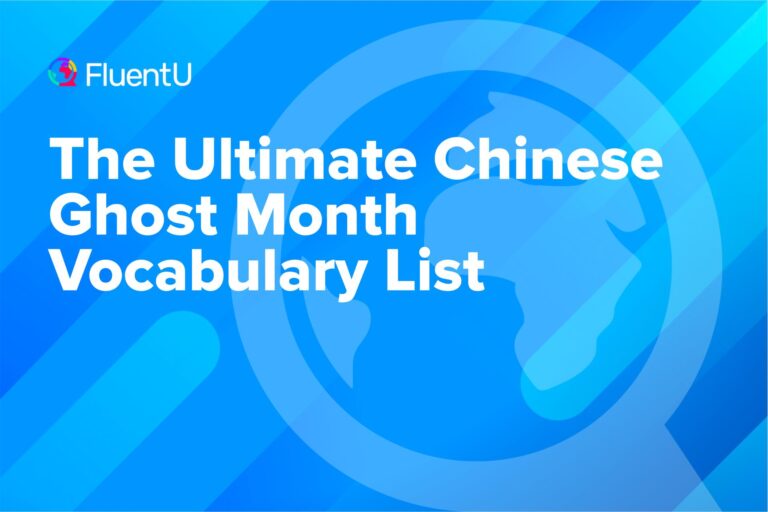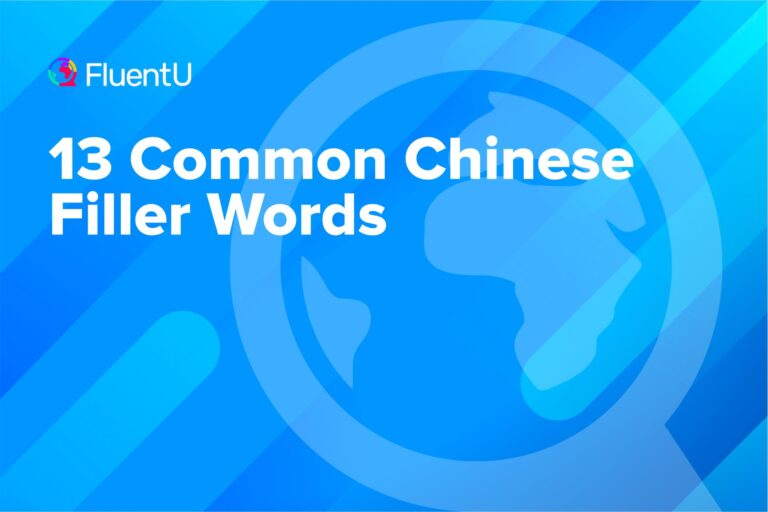45 Must-know Words and Phrases for Shopping in Chinese

When you need to find out how to get to the grocery store, where to buy painkillers for your massive migraine or how much the dress you’ve been eyeing costs, your Mandarin skills need to come in clutch.
There are tons of useful terms you need to know to successfully go shopping in Chinese—from asking questions to reading signs and labels.
So in this post, I’ll go over 15 must-know Mandarin phrases and 30 vocabulary words for your next Chinese shopping spree.
Download: This blog post is available as a convenient and portable PDF that you can take anywhere. Click here to get a copy. (Download)
Sections in a Store in Chinese
| Chinese | Pinyin | English |
|---|---|---|
| 服装 | fú zhuāng | Clothing |
| 食品 | shí pǐn | Food |
| 玩具 | wán jù | Toys |
| 家具 | jiā jù | Furniture |
| 鞋类 | xié lèi | Shoes |
| 化妆品 | huà zhuāng pǐn | Cosmetics |
| 电器 | diàn qì | Appliances |
| 体育用品 | tǐ yù yòng pǐn | Sporting goods |
| 图书 | tú shū | Books |
| 珠宝首饰 | zhū bǎo shǒu shì | Jewelry |
| 数码产品 | shù mǎ chǎn pǐn | Electronics |
| 办公用品 | bàn gōng yòng pǐn | Office supplies |
| 宠物用品 | chǒng wù yòng pǐn | Pet supplies |
| 美术用品 | měi shù yòng pǐn | Art supplies |
| 日用品 | rì yòng pǐn | Household items |
Types of Stores in Chinese
| Chinese | Pinyin | English |
|---|---|---|
| 超市 | chāo shì | Supermarket |
| 百货商店 | bǎi huò shāng diàn | Department store |
| 书店 | shū diàn | Bookstore |
| 电器店 | diàn qì diàn | Electronics store |
| 五金店 | wǔ jīn diàn | Hardware store |
| 服装店 | fú zhuāng diàn | Clothing store |
| 食品店 | shí pǐn diàn | Grocery store |
| 家具店 | jiā jù diàn | Furniture store |
| 化妆品店 | huà zhuāng pǐn diàn | Cosmetics store |
| 珠宝店 | zhū bǎo diàn | Jewelry store |
| 玩具店 | wán jù diàn | Toy store |
| 体育用品店 | tǐ yù yòng pǐn diàn | Sporting goods store |
| 鞋店 | xié diàn | Shoe store |
| 药店 | yào diàn | Pharmacy |
| 市场 | shì chǎng | Market |
How to Ask Questions When Shopping in Chinese
1. 百货公司在哪儿?
Pinyin: bǎi huò gōng sī zài nǎ ér?
English: Where is the department store?
Another word for “department store” is 百货商店 (băi huò shāng diàn).
If you’re asking where the shopping mall is located, use 商场 (shāng chǎng), 超级市场 (chāo jí shì chǎng) for supermarket or 夜市 (yè shì) for the night market.
These are probably the most common words you’ll encounter when going shopping in Chinese.
2. 几楼是女装?
Pinyin: jǐ lóu shì nǚ zhuāng?
English: Which floor is the women’s section?
You can use 男装 (nán zhuāng) for menswear.
3. 孕妇装在哪里卖?
Pinyin: yùn fù zhuāng zài nǎ lǐ mài?
English: Where do you sell maternity dresses?
孕妇 refers to a pregnant woman. So attach a 装 to it, and it becomes “maternity dress” since 装 refers to clothing.
Use 香水 (xiāng shuǐ) if you’re looking for perfume, and 长裤 (cháng kù) for pants. You can also check out this post for a complete list of clothing items.
4. 我可不可以试一下? 你们试衣间在哪儿?
Pinyin: wǒ kě bú kě yǐ shì yī xià? nǐ men shì yī jiān zài nǎr?
English: Can I try this on? Where is your fitting room?
When trying on clothes, find out how many items you can bring to the fitting room at a time. Sometimes you can bring three to five items depending on where you shop, so read the signs carefully.
Normally someone is there to assist you, just like shops in the United States.
If you have to call their attention, use 小姐 (xiăo jiĕ) — miss and 先生 (xiān shēng) — sir.
5. 你们附近有没有洗手间?
Pinyin: nǐ men fù jìn yǒu méi yǒu xǐ shǒu jiān?
English: Is there a restroom nearby?
洗手间 is the word for restroom. This is the more common way of saying it, although some people still use 厕所 (cè suŏ).
How to Check Out Your Items in Chinese
6. 这件多少钱?
Pinyin: zhè jiàn duō shǎo qián?
English: How much is this piece?
There are many ways you can ask about the price.
For example, if you’ve already chosen your items, you can tell the cashier 请帮我算一下 (qǐng bāng wǒ suàn yī xià). Then, the cashier would ring up all your items.
7. 简直太贵了! 给我便宜点吧!
Pinyin: jiăn zhí tài guì le! gěi wǒ pián yi diǎn ba!
English: This is really too expensive. Please give me a lower price.
Use this phrase when you’re in the night market or when you’re buying from street-side vendors where there are no fixed prices.
If the seller gives you a price, you can say 再便宜一点 (zài pián yi yì diǎn) — make it cheaper.
This was particularly useful for me when I was shopping in Shanghai. I was trying to haggle for a lower price and kept saying this. And it worked! The lady gave me a lower price.
Just a tip when shopping: if they don’t agree to your price, you can walk out of the shop. They normally then call you back and agree to your rate. So start practicing your bargaining skills and you’ll get the best price out there.
One of the best ways to prepare to go shopping in Chinese is by observing. You can watch videos—like the videos on FluentU—to start feeling more comfortable in authentic, on-the-streets Chinese scenarios.
FluentU takes authentic videos—like music videos, movie trailers, news and inspiring talks—and turns them into personalized language learning lessons.
You can try FluentU for free for 2 weeks. Check out the website or download the iOS app or Android app.
P.S. Click here to take advantage of our current sale! (Expires at the end of this month.)
8. 我要刷卡。
Pinyin: wǒ yào shuā kǎ.
English: I’m paying with my card.
At the cashier, they’ll usually ask you: 刷卡吗? (Are you paying with your card?).
When you’re paying with credit, you can nod and say 要刷卡 , but say 现金 (xiàn jīn) when you’re paying with cash.
9. 我要这件。 请给我大号的。
Pinyin: wǒ yào zhè jiàn. Qǐng gěi wǒ dà hào de.
English: I want this piece. Please give me the large size.
Use 大号 if you want large, 中号 (zhōng hào) for medium and 小号 (xiăo hào) for small.
小号 are sizes 88 to 90, which is equivalent to sizes 4 to 6 in the US and 34 to 36 in Europe.
大号 is 98 to 102, which is equivalent to size 12 to 14 in the US and size 42 in Europe.
That’s for ladies. For men, 小号 (small) is sizes 88 to 90, 中号(medium) is 96 to 98, 大号 (large) is 108 to 110 and so on.
But if you got the wrong size and want to return your purchase, you can always tell them that 我想把这件退回去 (wǒ xiǎng bǎ zhè jiàn tuì huí qù). This means that “I want to return these items back.”
10. 这些衣服已经是折扣后的价格吗?
Pinyin: zhè xiē yī fu yǐ jīng shì zhé kòu hòu de jià gé ma?
English: Are the prices of these clothes already discounted?
折扣 means discount. You can also use 打折 (dă zhé), which means discount or sale, depending on how you use them in your questions.
Whenever items are on sale, you can see a lot of signs announcing this. But be aware of their meanings.
For example, if it’s written as 打七折 (dǎ qī zhé), it means that the items are 30% off and not 70% off. Another is “ 4折起 ” (sì zhé qĭ), which means that it’s up to 60% off.
How to Read Washing Instructions in Chinese
11. 禁止漂白。
Pinyin: jìn zhĭ piăo bái.
English: Do not bleach.
漂白 means to bleach. Always look at the tag before washing to avoid fading the color of your clothes.
12. 你那件只要干洗就好了。
Pinyin: nǐ nà jiàn zhǐ yào gān xǐ jiù hǎo le.
English: Dry cleaning is enough for that piece.
13. 请低温熨烫。
Pinyin: qǐng dī wēn yùn tàng.
English: Please iron at low temperature.
14. 不能使用洗衣机,只能手洗。
Pinyin: bú néng shǐ yòng xǐ yī jī ,zhǐ néng shǒu xǐ.
English: Do not use the washing machine. Hand wash only.
Some pieces of clothing are more sensitive, so watch out for words like these.
洗衣机 means washing machine, and most tags would indicate that you should not wash that item using the machine.
15. 这是百分之百棉吗?
Pinyin: zhè shì bǎi fēn zhī bǎi mián ma?
English: Is this 100% cotton?
棉 means cotton. Examining the clothing and looking at the tag before ringing up any of your purchases is important. For silk, we use 丝 (sī).
Now, you’re all set to go shopping. Remember these phrases and you’ll surely have the best shopping experience in China. And while you’re there, don’t forget to look our for deals and use your great bargaining tips!
Download: This blog post is available as a convenient and portable PDF that you can take anywhere. Click here to get a copy. (Download)
And One More Thing...
If you want to continue learning Chinese with interactive and authentic Chinese content, then you'll love FluentU.
FluentU naturally eases you into learning Chinese language. Native Chinese content comes within reach, and you'll learn Chinese as it's spoken in real life.
FluentU has a wide range of contemporary videos—like dramas, TV shows, commercials and music videos.
FluentU brings these native Chinese videos within reach via interactive captions. You can tap on any word to instantly look it up. All words have carefully written definitions and examples that will help you understand how a word is used. Tap to add words you'd like to review to a vocab list.
FluentU's Learn Mode turns every video into a language learning lesson. You can always swipe left or right to see more examples for the word you're learning.
The best part is that FluentU always keeps track of your vocabulary. It customizes quizzes to focus on areas that need attention and reminds you when it’s time to review what you’ve learned. You have a 100% personalized experience.
Start using the FluentU website on your computer or tablet or, better yet, download the FluentU app from the iTunes or Google Play store. Click here to take advantage of our current sale! (Expires at the end of this month.)











